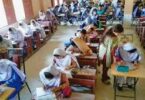DHAKA (Reuters): A searing heatwave in Bangladesh spurred the closure of primary schools this week and triggered frequent power cuts, worsening conditions for residents unable to run fans to cool themselves as weather officials warned relief was not imminent.
The maximum temperature soared to nearly 41 degrees Celsius (105.8 Fahrenheit) from 32 degrees Celsius 10 days ago. The Bangladesh Meteorological Department warned that there was no end in sight to the heat.
Scientists have said climate change is contributing to more frequent, severe, and longer heat waves during summer months.
Bangladesh could face power cuts for two more weeks, said Nasrul Hamid, minister of state for power, energy and mineral resources, as a fuel shortage sparked shutdowns of several power-generating units, including its biggest coal-fired plant.
“Due to the global energy crisis and the unprecedented surge in international currency markets, we are exposed to this unwanted load shedding,” Hamid said in a Facebook post late on Monday.
The heatwave comes as the country already grapples with power cuts that have hurt its economy in recent months, including its crucial apparel sector which accounts for more than 80% of its exports.
“The weather is unreasonably hot these days but the hours-long power cuts further add to our miseries,” said Mizanur Rahman, a shopkeeper in the capital Dhaka.
Residents were seeking medical attention due to the heat.
“We are getting many patients who have suffered heat-stroke or other heat-related problems,” said Shafiqul Islam, a physician in the northwestern part of the country.
The loss of exports will exacerbate issues around the country’s dollar reserves, which have plunged by nearly a third in the 12 months through April to a seven-year low, and limited its ability to pay for fuel imports.
“I am deeply sorry for your suffering. I also want to assure you this situation is temporary. We will be back in good condition very soon,” Hamid said.







